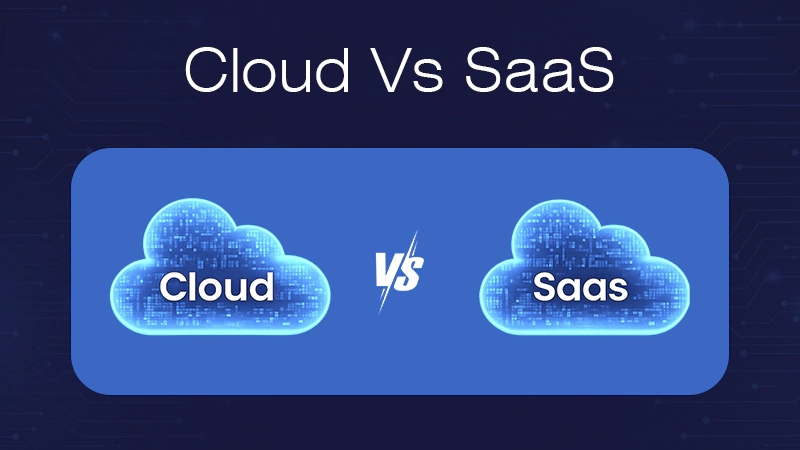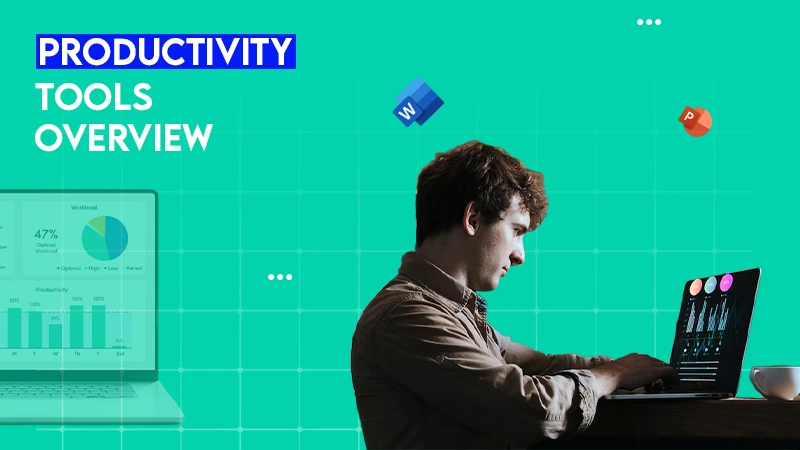Ans: QuickBooks is the most-used and best accounting software for small businesses and large enterprises alike. It is trusted by millions of people worldwide because of its ease of use and strong integration features.
Best Accounting Software For Small Business in 2025: Features, Pricing, and Specifications
Accounting software is no longer a luxury but a necessity for small and big businesses alike. From handling invoices, tracking inventory, and budgeting, to managing complex operations, one accounting program can do the job. And the best part? You do not need to have a background in accounting to use them.
These tools have the power to automate repetitive tasks, reduce errors, and provide a clear view of your company’s financial health. If there’s one crucial investment you need to make for your business, it should be getting cloud accounting software.
We have listed down the top services with their pros and cons in our article. So have a look and see which one can supercharge your business.
1. QuickBooks Online
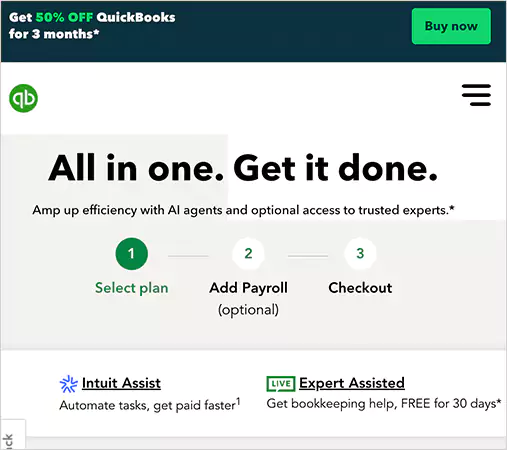
Quickbooks online is the most famous and widely used medium to small business accounting software, used by millions of people worldwide. It is designed to manage the financing, invoicing, inventory, and sales tax part of the business. The best part is, it offers multi-tiered plans suitable for all types of budgets and integrates with almost every business tool.
| Pros | Cons |
| Beginner-friendly interface. | The plans with advanced features are expensive. |
| Various options for integration. | Limited features and integration options in basic plans. |
| Strong security features. | |
| Detailed reporting and analysis. |
Pricing: Basic plans start at $30/month; higher plans go up to $200/month. Offers a free trial.
Specifications:
- Platforms: Windows, macOS, iOS, Android
- Set-Up: Cloud-based
- Integrations: PayPal, Shopify, Stripe, HubSpot, Square, Mailchimp
- Customer Support: Call, live chat, email, community forum
- Core Features: Invoicing, inventory tracking, bank reconciliation, payroll, and reporting.
Who is it best for? – Works best for small to medium-sized businesses that are in the scaling phase.
2. Xero
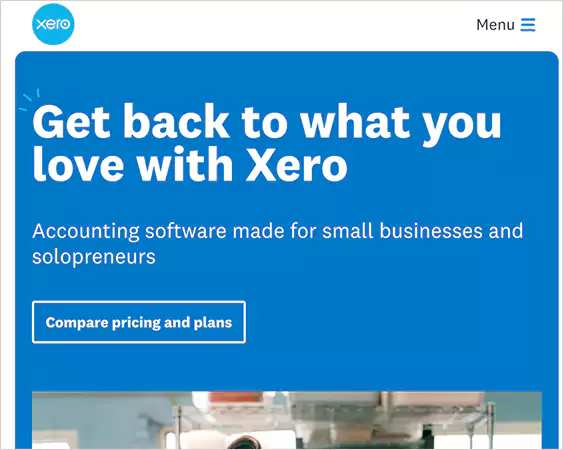
The next on our list is Xero, which is another highly praised accounting software. It supports over 1000 apps and helps in invoicing, payroll, and billing with a dedicated client profile. The best part is, Xero has a simple and easy-to-use interface, making it perfect for small businesses and new founders testing accounting software programs.
| Pros | Cons |
| Allows unlimited user connections in all plans. | The advanced features need more understanding and a learning curve. |
| Great integration options. | Do not offer much phone support. |
| User-friendly interface and easy-to-use dashboard. |
Pricing: Basic plan costs $15/month; Premium plan costs $78/month.
Specifications:
- Platforms: Windows, macOS, iOS, Android.
- Set-Up: Cloud-based
- Integrations: Shopify, Square, HubSpot, Stripe, and more.
- Customer Support: Email, live chat, 24/7 help center.
- Core Features: Allows unlimited users, supports invoicing, billing, and payroll.
Who is it best for? – Small and growing businesses that need unlimited user access and flexibility.
3. FreshBooks
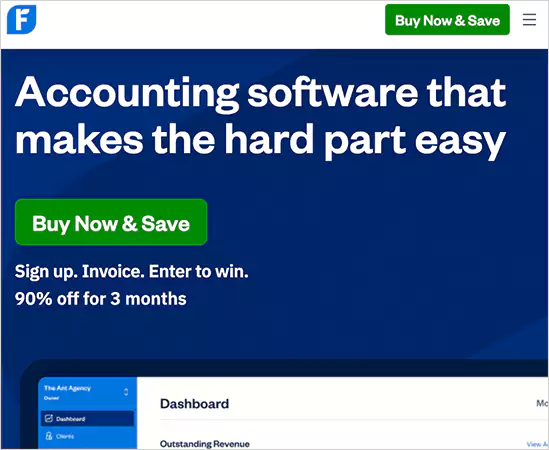
FreshBooks is an accounting platform founded in 2003 to simplify accounting and invoicing. This bite-sized software is best suited for freelancers, small businesses, and medium scale companies. It mainly focuses on time tracking of end-to-end delivery of product and invoicing. If you are looking for a simple accounting software that is approachable for non-accountants yet offers industry-standard features, FreshBooks is the one for you.
| Pros | Cons |
| Has a dedicated customer support team. | Do not have advanced accounting features. |
| Clean and minimal interface for all businesses. | Charges for adding users increase the cost. |
| Best used for time tracking and invoicing purposes. |
Pricing: Basic plan starts at $19/month; Plus plan at $33/month; Premium at $60/month.
Specifications:
- Platforms: Windows, macOS, iOS, Android.
- Set-Up: Cloud-based system
- Integrations: Supports Gusto, Trello, Asana, Shopify, Zapier, Stripe.
- Customer Support: Phone, email, chat
- Core Features: Time tracking, inventory management, invoicing, and dedicated client portals.
Who is it best for? – Works best for freelancers, one-person businesses focused on client billing and invoicing.
Check Out: What is SaaS Marketing? A Complete Beginner’s Guide (2025)
4. Wave Accounting
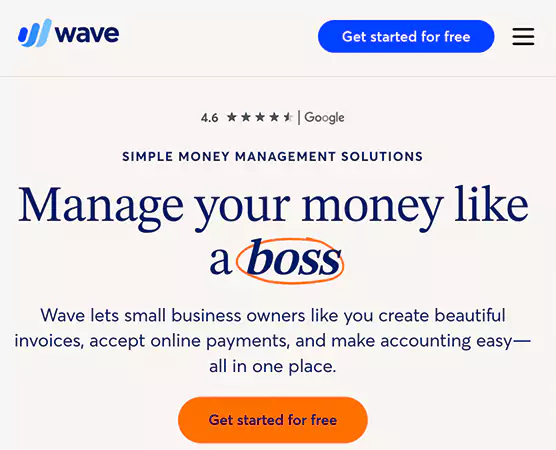
Wave accounting is the accounting software for small business free. It is specifically designed for small enterprises and freelancers with limited resources to offer income and expense tracking, invoicing, and scanning receipts. If you want to have a platform to manage financing but do not want to spend money, you can check this one out.
| Pros | Cons |
| Completely free accounting software. | Does not have many integration options. |
| Best for small businesses. | Does not have advanced features like an inventory or payroll. |
| Has invoicing and receipt scanning features. |
Pricing: Free plans; payment-based add-ons for payroll and payment processing.
Specifications:
- Platforms: Windows, macOS, iOS, Android
- Set-Up: Cloud-based setup
- Integrations: PayPal, Stripe, Shoeboxed
- Customer Support: Email, chat, and help centre
- Core Features: Invoicing, expense tracking, bank connections, receipt scanning, and billing.
Who is it best for? – Freelancers and small companies that need accounting support at no extra cost.
5. Zoho Books
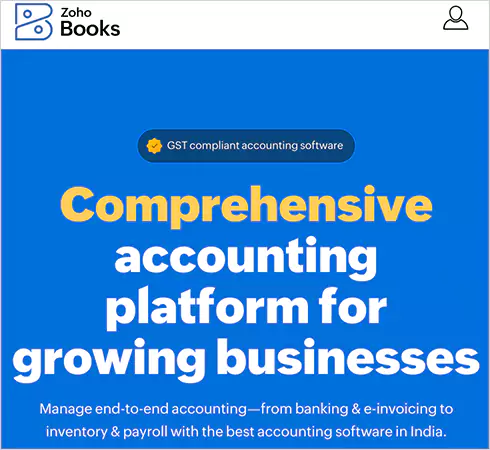
Zoho Books is a pretty affordable accounting software supporting invoicing and all accounting solution for all types of businesses. This one’s the best investment if you use Zoho CRM or other Zoho tools. With its project tracking and automation features, Zoho Books can seamlessly enhance your operation process.
| Pros | Cons |
| Has affordable prices, best for small businesses. | Limited third-party integration options. |
| Offers many automation features and extra tools. | Payroll support is restricted to many countries. |
| Package prices drop upon bundling with other Zoho products. |
Pricing: Basic plan costs $20/month; Professional plan at $50/month.
Specifications:
- Platforms: Windows, macOS, iOS, Android
- Set-Up: Cloud-based system
- Integrations: Zoho CRM, Stripe, PayPal
- Customer Support: Email, live chat with the team, and phone support.
- Core Features: Expense tracking, invoicing, automation, tax compliance, and client portal.
Who is it best for? – Business already using Zoho products and looking for automation.
6. Sage Business Accounting Software

Sage is a prominent entity in business accounting, providing resources for cash flow projections, invoicing, regulatory and compliance support, and multi-currency support. Its robust tax and compliance capabilities is what attracts businesses to invest in this software, as it can easily handle operations in all types of company running with multiple currency.
| Pros | Cons |
| Offers strong compliance checking and taxing tools. | The interface is outdated and hard to process at first. |
| Allows working with multiple currencies. | Do not offer many beginner-friendly tools. |
| Works best for scaling businesses. |
Pricing: Basic plan costs $10/month; Professional plans vary depending on features.
Specifications:
- Platforms: Windows, macOS, iOS, Android.
- Set-Up: Desktop version and cloud system.
- Integrations: Microsoft 365, Stripe, PayPal, AutoEntry.
- Customer Support: Phone and email support.
- Core Features: Cash flow management, detailed reporting, multi-currency support, and VAT compliance.
Who is it best for? – Businesses that need tax and compliance tools and multiple currency support.
7. NetSuite ERP
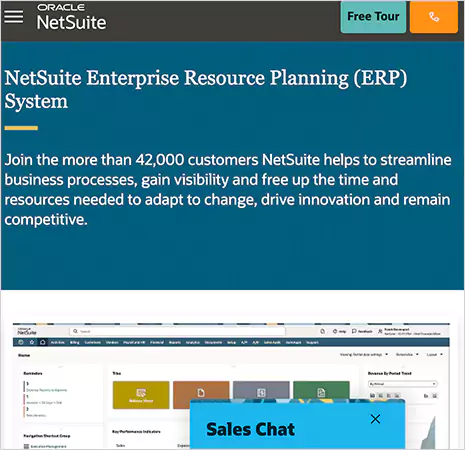
NetSuite ERP by Oracle is a top-tier business accounting software with comprehensive accounting and business management features. It is among the finest ERP solutions in the world, offering advanced tools and systems that are best suited for large enterprises and accountants. NetSuite has a dedicated and customizable dashboard that helps businesses operate more efficiently and make data-driven decisions
| Pros | Cons |
| This one works as an all-in-one enterprise software. | Difficult to learn and understand. |
| Offers great options to customize the dashboard. | Plans are costlier than competitors. |
| Advanced analytics tools and detailed reporting features. |
Pricing: Custom pricing based on business size and features.
Specifications:
- Platforms: Windows, macOS, iOS, Android
- Set-Up: Cloud-based system.
- Integrations: Salesforce, Shopify, Magento, ERP systems.
- Customer Support: 24/7 email and chat support.
- Core Features: fixed asset management, revenue reports, advanced accounting, expenses forecasting, and CRM.
Who is it best for? – Works well for large enterprises with multi-department accounting and reporting needs.
Check Out: The Rule of 40 in SaaS: Meaning, Benefits, Limitations, and How It Helps Investors and Founders
8. Patriot Accounting Software
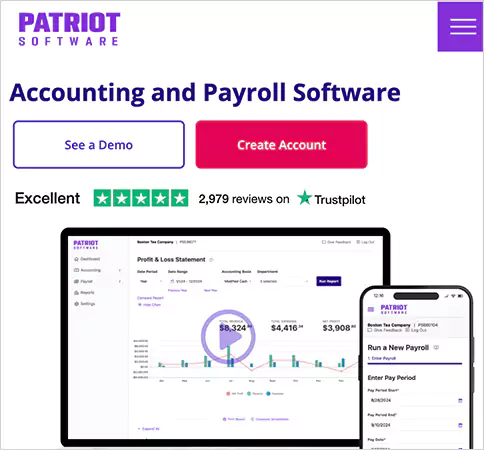
Patriot is the best small business accounting software that is affordable as well as simple to use. Its beginner-friendly interface makes invoicing, expense tracking, and bank reconciliation much easier. Moreover, it can detect errors, automate repetitive task, and make detailed reporting of the operations and finances.
| Pros | Cons |
| Affordable plans, best suited for small businesses. | Limited advanced features and fewer integration options. |
| Simple and easy-to-use interface. | Does not work well with large enterprises. |
| A dedicated user dashboard to manage the whole backend of the company. |
Pricing: Basic plan costs $20/month; plans with payroll add-ons cost $37/month.
Specifications:
- Platforms: Windows, macOS, iOS, Android
- Set-Up: Cloud-based system.
- Integrations: QuickBooks, Payroll, and payment processors.
- Customer Support: Calling, email, and live chat support.
- Core Features: Invoicing, expense tracking, payroll integration, and accounts management.
Who is it best for? – Small businesses looking for affordable accounting tools with payroll support and simple features.
How to Choose the Right Accounting Software?
Every business accounting software you come across will not be the right one for you because every business has its own objectives. In order to find the one that is best, you must look after your business needs, budget, and the plan of growth. Here are a few tips that can help you:
- Check Your Requirements: Identify what are the core aspects that you need. Whether it is accounting, customer relationship management, data analysis, reporting, or multi-currency support, go for the one that meets your goals.
- Consider Ease of Use: It is crucial to check if the interface of the software is simple and easy to understand, especially if you are a beginner. The software with complex features is are waste of money and time if you are not a pro.
- Integration Capabilities and Scalability: Make sure it connects with your CRM, eCommerce platforms, payment processors, or other tools you currently utilize for your business operations. Plus, pick one that can grow with your business by simply adding features and top-ups.
- Cost Vs Value and Security Features: You must see if the software you are purchasing is giving enough value and input into your business based on the price you are paying. Also, check out all the security features the software has, including encryption and, multiple-layer shield to protect your private and sensitive data.
Wrapping Up!
Online accounting software programs are the game-changer for businesses. They handle everything seamlessly, from accounting, CRM, bookkeeping, to tracking inventory and reporting. Moreover, it also helps to understand the current position of the operations and analyze the shortcomings.
We have listed the best small business management software in this blog with their features, pricing, and specifications. It would be best if you try a free trial period of each one and find the best one for yourself.
Read Next: What is B2B SaaS? Meaning, Companies, Examples, and More
FAQs
Q: What Is The Most Used Accounting Software?
Q: Which Software Is Best For Accounting?
Ans: QuickBooks, FreshBooks, and Xero are highest highest-ranked online accounting software by the users worldwide.
Q: What Is SAP Accounting System?
Ans: The SAP accounting system is the part of the ERP software that manages accounting, reporting, and compliance management tools for small to large businesses.
Q: Is Google Sheets An Accounting Software?
Ans: No, Google Sheets is a basic spreadsheet tool that can be used for simple accounting and manual data entry.
Q: Is There A Google Alternative To QuickBooks?
Ans: No, Google does not offer any dedicated accounting software like QuickBooks. However, its products, like Sheets and Docs, can be integrated with any cloud accounting software easily.


